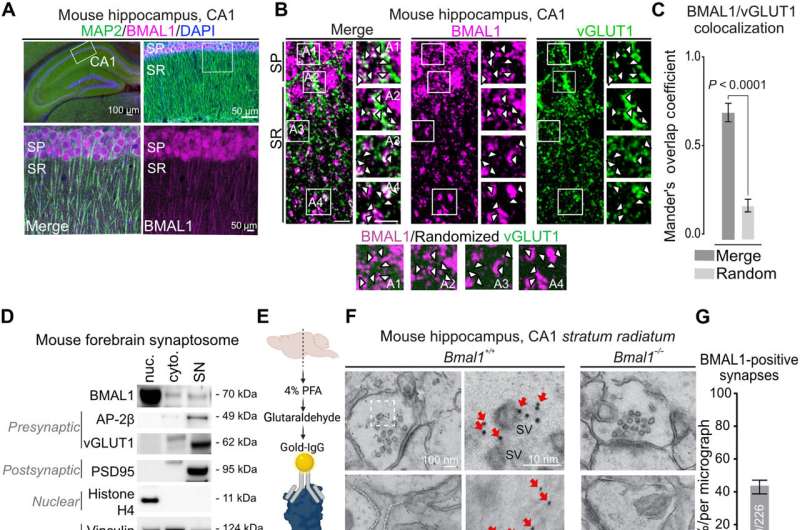This article has been reviewed according to Science X's editorial process and policies. Editors have highlighted the following attributes while ensuring the content's credibility:
fact-checked
peer-reviewed publication
trusted source
proofread
Timing is everything: How circadian rhythms influence our brains

Why are we mentally sharper at certain times of day? A study led by Jonathan Lipton MD, Ph.D., at Boston Children's Hospital spells out the relationship between circadian rhythms—the body's natural day/night cycles—and the brain connections known as synapses.
The work is the first to provide a cellular and molecular explanation for natural fluctuations over the day in alertness, cognition, and the ability to learn and remember.
"We have known for more than a century that the time of day influences cognition and memory, but until now the mechanisms have been elusive," says Lipton, a sleep physician in the Department of Neurology and researcher in the F.M. Kirby Neurobiology Center.
In 2015, Lipton and colleagues described in the journal Cell how a "clock" protein called BMAL1 masterminds the timing of protein production in cells.
In the new study, led by Ilaria Barone, Ph.D., and published in Science Advances, they show that BMAL1 shows up at brain synapses at particular times of day, regulating the synapses' ability to respond to changes in the environment and thereby enabling the brain to learn and encode memories.
Lipton thinks that the brain takes advantage of our natural circadian rhythms to conserve energy for when it's needed. "Cognitive processes are highly energetically demanding," he explains.
Though just a first salvo, the work suggests the possibility of optimizing cognitive function in conditions that affect synapses and have a circadian component—like Alzheimer's disease, bipolar disorder, Parkinson's disease, tuberous sclerosis complex, and Fragile X syndrome.
Could we optimize cognitive function via BMAL1?
The findings are the culmination of six years of painstaking work, and, at Lipton's count, more than a dozen different laboratory techniques.
The researchers focused on the hippocampus, which has notable circadian fluctuations, and found that a small chemical change prompts BMAL1 to interact with CaMKIIa, a critical organizer of synaptic function and memory formation. They were able to block that interaction without affecting other core clock functions such as timing of sleep/wake cycles or metabolism.
Beyond the hippocampus, Lipton and colleagues have also observed BMAL1 in synapses in the cortex and cerebellum, so their findings could extend to other brain functions.
"We can begin to explore how the gating of synapses may be corrupted in neurodegenerative and neurodevelopmental diseases," Lipton says.
"We can look what's happening to the rhythm of the clock protein and how can we optimize it. One exciting thing is that the interaction of BMAL1 and CaMKIIa is a biochemical event, phosphorylation, that can potentially be targeted with drugs. I feel like this is the beginning of lots of other work."
More information: Ilaria Barone et al, Synaptic BMAL1 phosphorylation controls circadian hippocampal plasticity, Science Advances (2023). DOI: 10.1126/sciadv.adj1010




















